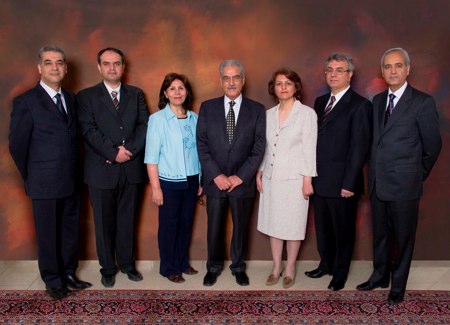 After more than a year of incarceration, the situation of the former leaders (Yaran, meaning “friends”) of the Baha’i community of Iran appears to be of profound concern.
After more than a year of incarceration, the situation of the former leaders (Yaran, meaning “friends”) of the Baha’i community of Iran appears to be of profound concern.
According to various reports, the seven former leaders of the Baha’i community continue to languish in “temporary” incarceration in a high-security section of the notorious Evin prison, known as section 209. The seven members are Mahvash Sabet (imprisoned since Mar 2008), and the following who have been imprisoned since May 2008: Jamaloddin Khanjani, Saeid Rezaie, Fariba Kamalabadi, Vahid Tizfahm, Behrouz Tavakkoli, and Afif Naeimi.
Pressure on the former Yaran, charged with “espionage on behalf of Israel”, “insulting the sacredness of Islam”, “propaganda against the regime”, and “aiding, teaching and propagating the Baha’i religion in Iran” (tantamount to “mufsed fel-arz” [corrupt on earth] which has historically carried harsh consequences, including the death penalty) includes having had their trial date postponed several times. The trial is now set for next Tuesday, but could once again be delayed by the authorities. The imprisoned former leaders have had no access to their attorneys, led by Nobel Peace prize-winner Shirin Ebadi, who is actually out of country. In fact, their primary lawyer, Mr. Soltani, is himself incarcerated along with many other human rights activists and other civil rights lawyers.
In addition to psychological pressure, such as routinely renewing the “temporary” imprisonment of the Yaran, or keeping them in a high-security facility which naturally imposes considerable restrictions on the seven individuals, it is reported that their meal portions have now been reduced considerably to the point that their health is at serious risk. At the same time, prison authorities refuse to permit the families of prisoners to provide the much-needed provisions which would enable them to sustain the brutal conditions of their imprisonment.
Moreover, with the massive arrests of political and civil activists in recent weeks in Iran and curtailment of telephonic contact between prisoners in Evin and the outside world, the families of these prisoners of conscience have become deeply worried about the condition of their loved ones. The focus on recently imprisoned highly-placed former members of the Iranian regime makes it possible that maltreatment of Baha’i prisoners can take place without incurring significant global outrage.
Based on various reports, Iran Press Watch has been able to prepare the following latest profiles on four of the seven prisoners:
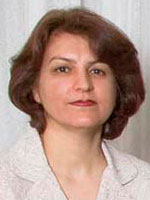 Fariba Kamalabadi has lost a lot of weight and is weak. She is also losing a great deal of hair. It is said that every time she pulls her fingers through her hair, a lot of hair comes loose in her hands.
Fariba Kamalabadi has lost a lot of weight and is weak. She is also losing a great deal of hair. It is said that every time she pulls her fingers through her hair, a lot of hair comes loose in her hands.
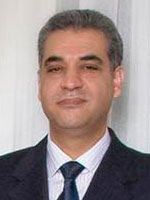 Afif Naeimi suffers from severe backache. Most of the time, he is lying down, unable to move or sit. He receives injections of pain killers whenever the pain becomes unbearable.
Afif Naeimi suffers from severe backache. Most of the time, he is lying down, unable to move or sit. He receives injections of pain killers whenever the pain becomes unbearable.
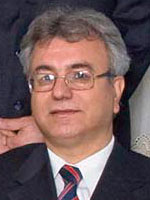 Saeid Rezaie has a hernia and badly needs surgery. Islamic authorities have not allowed him time off from prison for the operation, but the authorities offered to operate on him in prison. Considering the lack of necessary equipment and the high fatality record of those who have had surgery at Evin, he and his family refused the offer. As punishment for not agreeing to be operated on in the deplorable conditions of Evin, he was denied his short weekly visitation with his family for a long time. He also receives pain killer injections whenever the pain from his hernia becomes unbearable.
Saeid Rezaie has a hernia and badly needs surgery. Islamic authorities have not allowed him time off from prison for the operation, but the authorities offered to operate on him in prison. Considering the lack of necessary equipment and the high fatality record of those who have had surgery at Evin, he and his family refused the offer. As punishment for not agreeing to be operated on in the deplorable conditions of Evin, he was denied his short weekly visitation with his family for a long time. He also receives pain killer injections whenever the pain from his hernia becomes unbearable.
 Vahid Tizfahm, the youngest of the former Yaran, is losing his eyesight. The doctor has confirmed that this is due to his severely stressful conditions. Tizfahm’s father and uncle were among the many who were previously executed by the Islamic regime. His grieving mother has already lost her husband and her brother and now has to suffer the heartache of having her son in prison, uncertain of his fate. Though she is a very courageous woman, she is understandably saddened by her son’s hardships.
Vahid Tizfahm, the youngest of the former Yaran, is losing his eyesight. The doctor has confirmed that this is due to his severely stressful conditions. Tizfahm’s father and uncle were among the many who were previously executed by the Islamic regime. His grieving mother has already lost her husband and her brother and now has to suffer the heartache of having her son in prison, uncertain of his fate. Though she is a very courageous woman, she is understandably saddened by her son’s hardships.
Lest we forget, there are many other Baha’is imprisoned in Iran (see IranPressWatch1). A summation of our reports indicates that in Shiraz, for example:
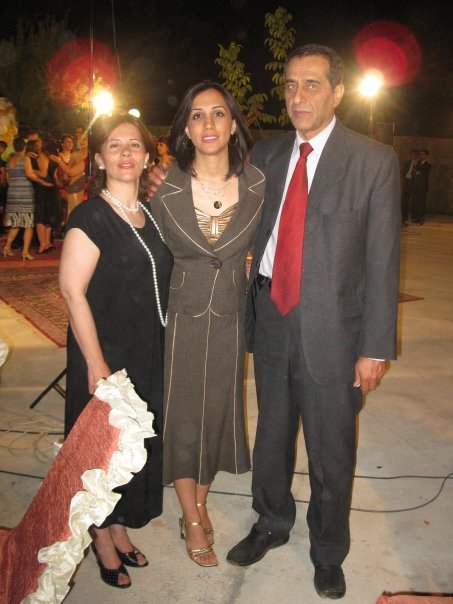 Haleh Rouhi’s mother had to have an operation a few weeks ago. The family requested a few days of family leave for Haleh to be with her mother, but their request was denied.
Haleh Rouhi’s mother had to have an operation a few weeks ago. The family requested a few days of family leave for Haleh to be with her mother, but their request was denied.
Sasan Taqva has been in solitary confinement for over 20 months. He is suffering from severe pain in his leg. Sometimes he feels numbness, loses balance and falls. His family tried hard to convince the authorities to consent to giving him a ten day leave to receive physiotherapy. During these long months of confinement, the bedding provided by prison officials has consisted of a mere two blankets on the bare concrete floor. Recently, authorities have agreed to give him a plastic chair, so that he does not have to sit on the concrete floor all the time.
Raha Sabet’s hobby is embroidery. Even her modest request to have her needlecraft supplies was denied.
One of the parents of the prisoners asked the prosecutor: “Is the ruling against these three detainees a verdict to drive them insane, that you keep them under such inhumane conditions and impose so much pressure on them?”
For further details on the three prisoners in Shiraz, to read the charges against them and their living conditions at the detention centre, plock 100, where they have been held for over 20 months, serving a four year prison term, see: http://www.iranpresswatch.org/post/3940, and http://www.iranpresswatch.org/post/3887
Economic Strangulation of Baha’is
Baha’is are forced into conditions of severe financial hardship. The financial pressure is becoming impossible to tolerate. In many instances, work permits for Baha’i shopkeepers are not renewed. Owners of privately held businesses are asked to fire their Baha’i employees. Islamic officials have asked many Muslim business partners, mainly in Shiraz, Isfahan, and Tehran, to discontinue business relationships with their Baha’i partners. If these Muslim partners disobey, the authorities have threatened that they will be charged with association with the wayward Baha’is and their business operations will be shut down.
An Upbeat Note
Ending on an upbeat note: the three Baha’i prisoners of Yasuj — Ali-Askar Ravanbakhsh, Zulaykha Musavi, and Ruhiyyih Yazdani — have been given a 5 day family leave from prison starting on August 12. This is their first leave in the last two months; they have been imprisoned since Oct 28, 2008.
August 16, 2009 5:18 pm
Mr.Khanjani’s brothers-in-law (Mr.Yussef Sobhani) was executed in 1980 in Evin.
http://www.wscountytimes.co.uk/mid-sussex-news/Fearing-for-her-uncles-life.5315012.jp